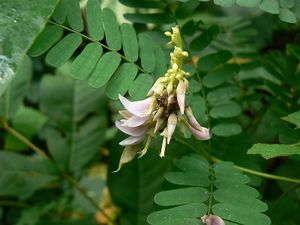Note: This is a project under development. The articles on this wiki are just being initiated and broadly incomplete. You can Help creating new pages.
Difference between revisions of "Abrus precatorius - Gunja"
Chaithrika (talk | contribs) (+adding image) |
m (Prabhakar moved page Gunja to Gunja (Abrus Precatorius)) |
(No difference)
| |
Revision as of 10:31, 29 March 2018
Abrus precatorius is a severely invasive plant in warm temperate to tropical regions, so much so that it has become effectively pantropical in distribution. It had been widely introduced by humans, and the brightly coloured and hard-shelled seeds had been spread by birds. By the end of the twentieth century, it had been proclaimed as an invasive weed in many regions including some in Belize, Caribbean Islands, Hawaii, Polynesia and parts of the mainland United States. In Florida in particular, the plant has invaded undisturbed pinelands and hammocks, including the vulnerable pine rocklands.Once Abrus precatorius plants have grown to maturity under favourable conditions, their deep roots are extremely difficult to remove, and the plants' aggressive growth, hard-shelled seeds, and ability to sucker, renders an infestation extremely difficult to eradicate and makes it very difficult to prevent re-infestation.
This fantabulous herb has a various benfits, some of them are listed below:
- The plant is used in Ayurveda and is said to promote hair growth. It is sometimes used as an ingredient in Indian hair products.
- Abrus precatorius, called kundu mani in Tamil and Guruvinda ginja in Telugu, has been used in Siddha medicine for centuries. The white variety is used to prepare oil that is claimed to be an aphrodisiac.
- A tea is made from the leaves and used for fevers, coughs and colds.
Common name
- English - Crabs eye
- Kannada - ಗುಲಗಂಜಿ
- Hindi - Gaungchi

